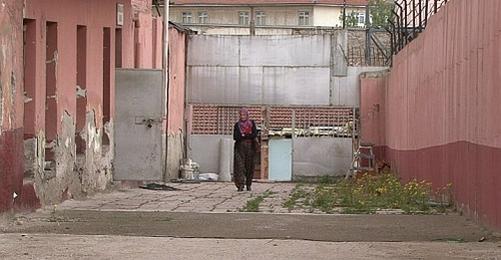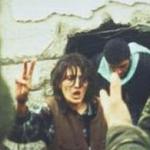26 September was the 12th anniversary of the massacre at the Ulucanlar Closed Prison in Ankara. On the very same day, the State Council signed a decision claiming that "the convicts prepared the ground for the intervention; they were killed because of their own mistakes".
Murat Özçelik, director of the film "The Living Deads", a documentary on the operation, said in a statement made to bianet, "The State Council decision reflects a hypocritical stance".
Soldiers acquitted
The living conditions of the detainees and convicts worsened quickly because 120 people stayed in wards designed for 30 inmates. The prisoners slept in turns on the dining tables. They could take a bath only once a month. They forwarded the conditions to the administration several times but did not receive any response. In turn, they decided not to participate in the daily count.
The detainees' and convicts' decision to boycott the daily count was the incentive to start the operation. The gendarmerie entered the prison in the morning of 26 September 1999. In the evening of the same day, ten prisoners had died and 78 were wounded. The press published pictures of beaten prisoners.
The autopsy report confirmed, "The majority of deaths occurred by shots fired at the head and heart. The bodies showed severe beating marks and bones were broken. Seven people were killed with bullets from rifles, three people with hunting rifle projectiles"
The Parliamentary Investigation Commission stated in its report that "the military and the police used excessive force that caused death and injuries". The Commission requested to prosecute the perpetrators.
The soldiers who were on trial related to the incidents were acquitted by the Ankara 6th High Criminal Court. No trial was opened against the commanders who directed the operation, particularly Lieutenant Colonel Ali Öz. The trial opened against the prisoners on the other hand is still pending.
Ten prisoners died in the course of the operation: Ahmet Savran, Aziz Dönmez, İsmet Kavlaklıoğlu, Ümit Altıntaş, Habip Gül, Halil Türker, Mahir Emsalsiz, Önder Gençaslan, Zafer Kırbıyık and Abuzer Çat.
The family of prisoner Kavlaklıoğlu filed a compensation claim directed at the Ministry of Justice with the Ankara 5th Administrative Court. The Administrative Court emphasized that "the right to life of the prisoners fell under the responsibility of the state" and decided for 5,000 TL (€ 2,500) on the grounds of a "severe mistake of service".
The decision was appealed by two ministries and hence forwarded to the State Council 10th Chamber. The State Council upheld the decision of the Administrative Court. However, the Chamber did not assess the incident as a service mistake but evaluated it as "the result of structural problems in prison that had been accumulating for years".
Both ministries appealed the decision of the State Council. This time, the Chamber decided the opposite way and ruled that the state had not made any mistake. However, the Administrative Court insisted on its initial decision and the file was forwarded to the State Council Trial Chambers Board. The board put forward that "the prisoners prepared the ground for the intervention" and acquitted the prison administration:
"The intervention was compulsory in order to maintain the public order in prison. It is impossible to accept the service operation of the administration as an indicator for incorrect behaviour".
"Unproportional"
45 out of 57 judges on the board decided against a compensation in favour of Kavlaklıoğlu's family. 12 judges gave a dissenting vote reasoning that "the force used in the course of the intervention was not considered appropriate with the principle of proportionality"
The families of deceased prisoners Habib Gül and Önder Gençaslan withdrew their compensation claim. In a previous decision, the State Council had ruled for compensation following the claim of the family of Ahment Svran.
"Why did you torture them?"
Movie director Özçelik was imprisoned in Ulucanlar at the time of the operation. He described the incidents as recalled from his personal memory:
"There was resistance of course but it was not a confrontation in the actual sense. There was no armed resistance and we did not use stones or sticks. There was no mutual clash in fact. This was well pre-planned and programmed pursuing one common goal".
"Then there was a resistance and a rebellion. If the aim was to thwart the rebellion, why did they torture the people afterwards? The operation was part of a process run by the state", Özçelik stated.
"They did not want any dialogue"
"From our perspective we could have reached a solution. The problem could have been solved in dialogue if the administration had wanted to do so (...)"
"The Ulucanlar massacre was the rehearsal for the Return to Life Operation. (...) The officials of the time confirmed this when they said 'We have been preparing this operation for one year'. They encouraged the media to show pictures of violence and of the injured people to threaten [the public] and to create fear".
"Hypocritical decision"
"We had no weapons as claimed by the State Council. İsmet Kavlaklıoğlu was not killed in the course of the armed clashes. He showed no signs of being shot when he was caught. They brought us to the bathroom after the operation where he died as the result of torture. I was there too at that time".
"From the perspective of the people who experienced the incident, the decision of the State Council is a hypocritical stance. They slide over the incident with a lamblike statement saying that the security forces 'used improportional force'. But unlimited and conscious violence was applied; a massacre was being done".
"They are free and we are on trial"
"The soldiers who were involved in the incident were not punished but we are still on trial. The soldiers said 'We fulfilled our order' and were acquitted. No trial was opened against the commanders. All prisoners on trial, including me, are facing prison sentences of up to 200 years. Some prisoners stand accused of having killed other prisoners. Furthermore, allegations of "damaging public property" have been put forward". (AS)











